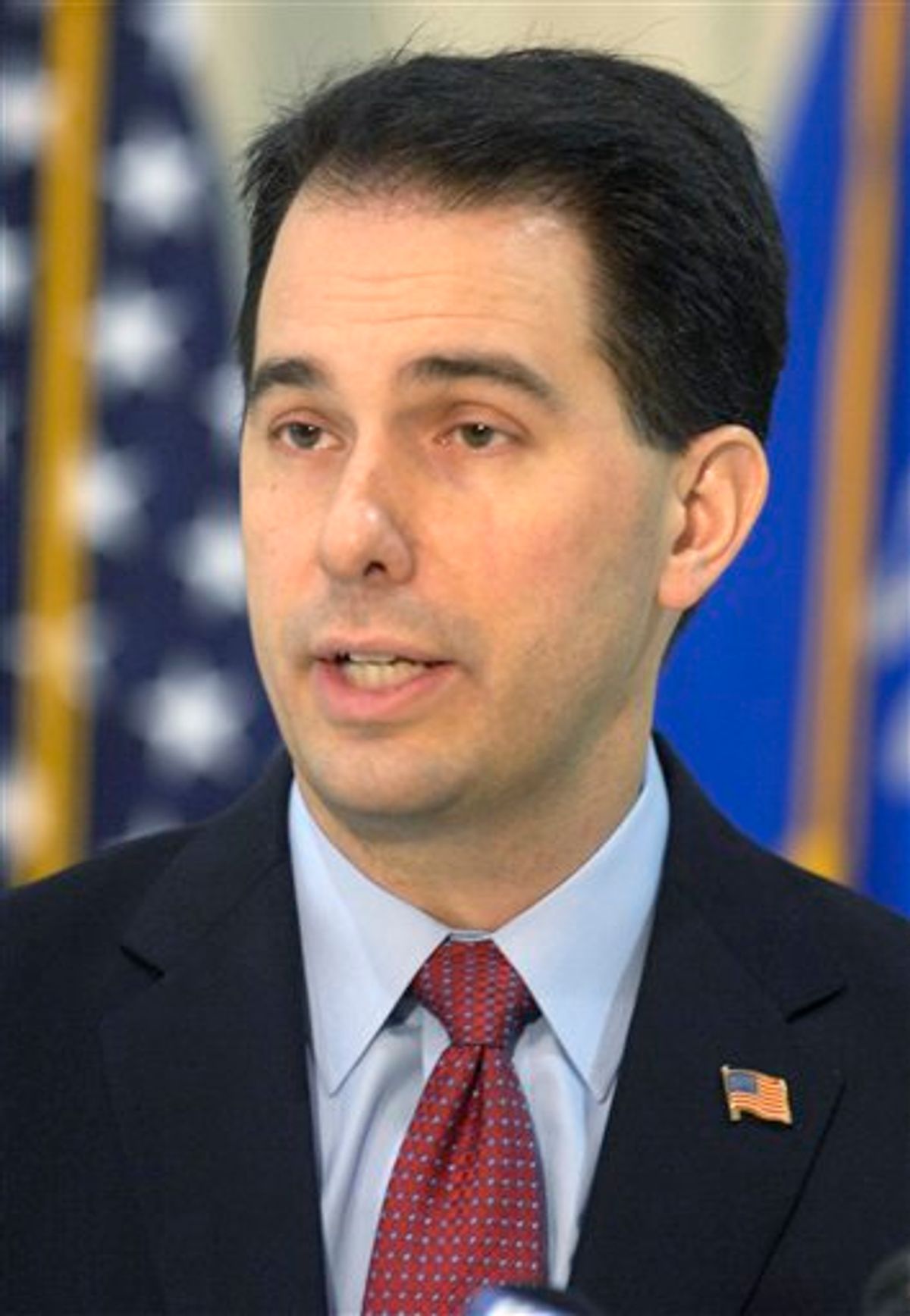Wisconsin Gov. Scott Walker, quickly becoming a darling of Republicans across the country for his plan to take away most collective bargaining rights from public workers, will get another chance to bolster his national conservative credentials when he unveils the rest of his plan for dealing with the state's budget woes.
Walker's plan -- set to be released Tuesday -- will include deep cuts for schools and local governments to help close a projected $3.6 billion shortfall in the two-year budget.
Walker already has taken on President Barack Obama and Wisconsin's unions, a traditional Democratic stalwart. Before he even took office, Walker's opposition to high-speed rail resulted in the Obama administration taking back more than $800 million that had been awarded to the state.
Obama has injected himself into the debate over collective bargaining, calling Walker's proposal an assault on unions. During a meeting of governors at the White House on Monday, which Walker did not attend, Obama said public workers do need to be called on to help solve state budget problems. But he added, "I don't think it does anybody any good when public employees are denigrated or vilified, or their rights are infringed upon."
Wisconsin's measure would forbid most government workers from collectively bargaining except over wage increased that aren't beyond the rate of inflation. Police and firefighters would be exempt.
Walker argues that his collective bargaining measure would free local governments from having to bargain with public employee unions as they deal with the cuts he'll outline Tuesday. The legislation is stalled in the Senate because its 14 Democratic members fled the state, leaving the body one vote short of a quorum.
After two weeks of massive protests, officials say there will be only limited access to the Capitol for Walker's budget address.
On Monday, police would not allow people to enter the building unless they were attending a public hearing or being escorted by lawmakers or their staff. Police said they were trying to resolve conflicts with a handful of protesters who had refused to move to the ground floor of the building where demonstrators were being told to stay. Hundreds marched outside the Capitol.
Walker's plan also calls on state workers to contribute 5.8 percent of their salaries toward pensions and double their health insurance contribution beginning April 1. Those changes would be expanded to nearly all other public workers, except those operating under existing union contracts, beginning July 1.
The higher benefit contribution would equate to an 8 percent pay decrease for the average worker. The state would save $30 million this fiscal year and $300 million over the next two years.
Walker said without those savings, 1,500 workers would have to be laid off between now and July and 12,000 state and local employees over the next two years.
Unions for teachers and state workers have said they would agree to the benefit concessions as long as they retain collective bargaining rights.
Labor leaders and Democratic lawmakers say Walker's proposal is intended to undermine unions and weaken a key Democratic voter base.
"He's not even conceding the fact that they've given them the money," Democratic Sen. Jon Erpenbach said in an interview in Chicago. "He's threatening their livelihoods. He's treating them like poker chips."
Walker has threatened that if the state doesn't pass his proposal by Tuesday, deeper cuts and layoffs would be required. Missing that deadline means the state won't be able to save $165 million through debt refinancing, Walker says.
A poll from the Pew Research Center released Monday found that 42 percent of adults surveyed nationwide sided with the unions and 31 percent sided with Walker in their dispute. That poll of 1,009 adults has a margin of error of plus or minus 4 percentage points.
And the latest New York Times-CBS poll found that Americans oppose efforts to weaken the collective bargaining rights of public employee unions by a margin of almost two to one -- 60 percent to 33 percent. The nationwide telephone poll of 984 adults had a margin of error of plus or minus three percentage points.
Both polls were conducted Feb. 24-27.
Wisconsin schools last week started putting teachers on notice that their contracts may not be renewed for next year given the budget uncertainty. Walker has confirmed he will propose cutting education aid by about $900 million, or 9 percent statewide.
"All of this turmoil, all of this chaos, are examples that Walker's proposals are too extreme," said Mary Bell, president of the Wisconsin Education Association Council. She said more than 2,000 teachers had received nonrenewal notices as of Monday.
School leaders are bracing for more bad news.
The governor is expected Tuesday to announce a new revenue limit that would require a $500 per-pupil reduction in property tax authority. The limits, in place since 1993, have gradually grown to reflect increasing education costs. That part of Walker's proposal alone would reduce the money available to the state's 424 districts by 7 percent, or nearly $600 million, based on a study done by University of Wisconsin-Madison economics professor Andrew Reschovsky.
"When you make unprecedented and historic cuts like these to schools, it means teachers are laid off, class sizes are larger, course offerings are reduced, extracurricular activities are cut, and whole parts of what we value in our schools are gone," state superintendent Tony Evers said in a statement.
Wisconsin's average teacher salary of about $48,000 ranks in the top half of states nationally, though it remains significantly behind the $60,000 average salaries in the top-paying states of California and Connecticut, according to U.S. Census Bureau figures. Wisconsin students also rank in the top half nationally on standardized tests, scoring a full percentage point better on the ACT college entrance exam.
Associated Press writers David Lieb in Madison and Dinesh Ramde in Chicago contributed to this report.



Shares